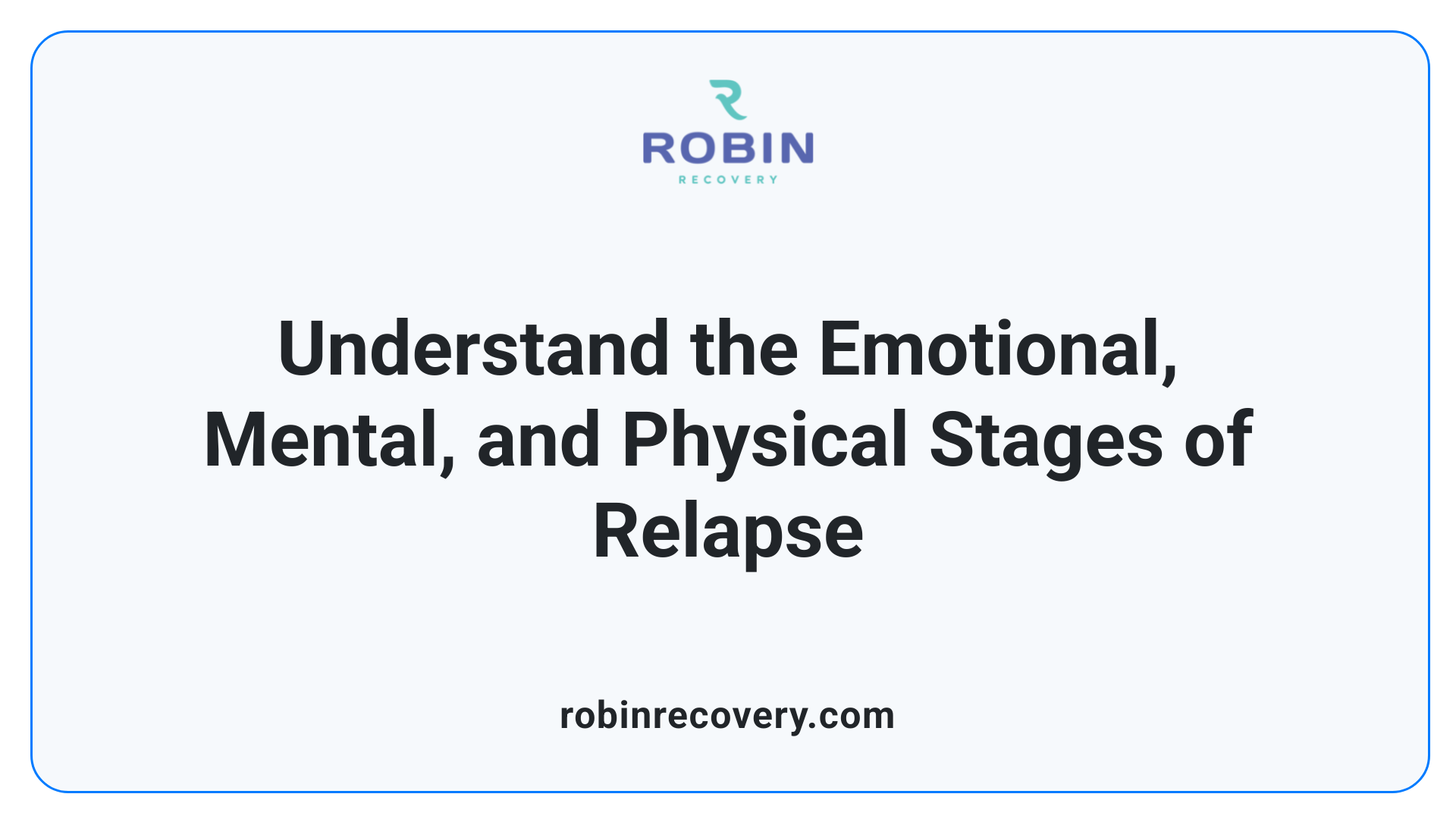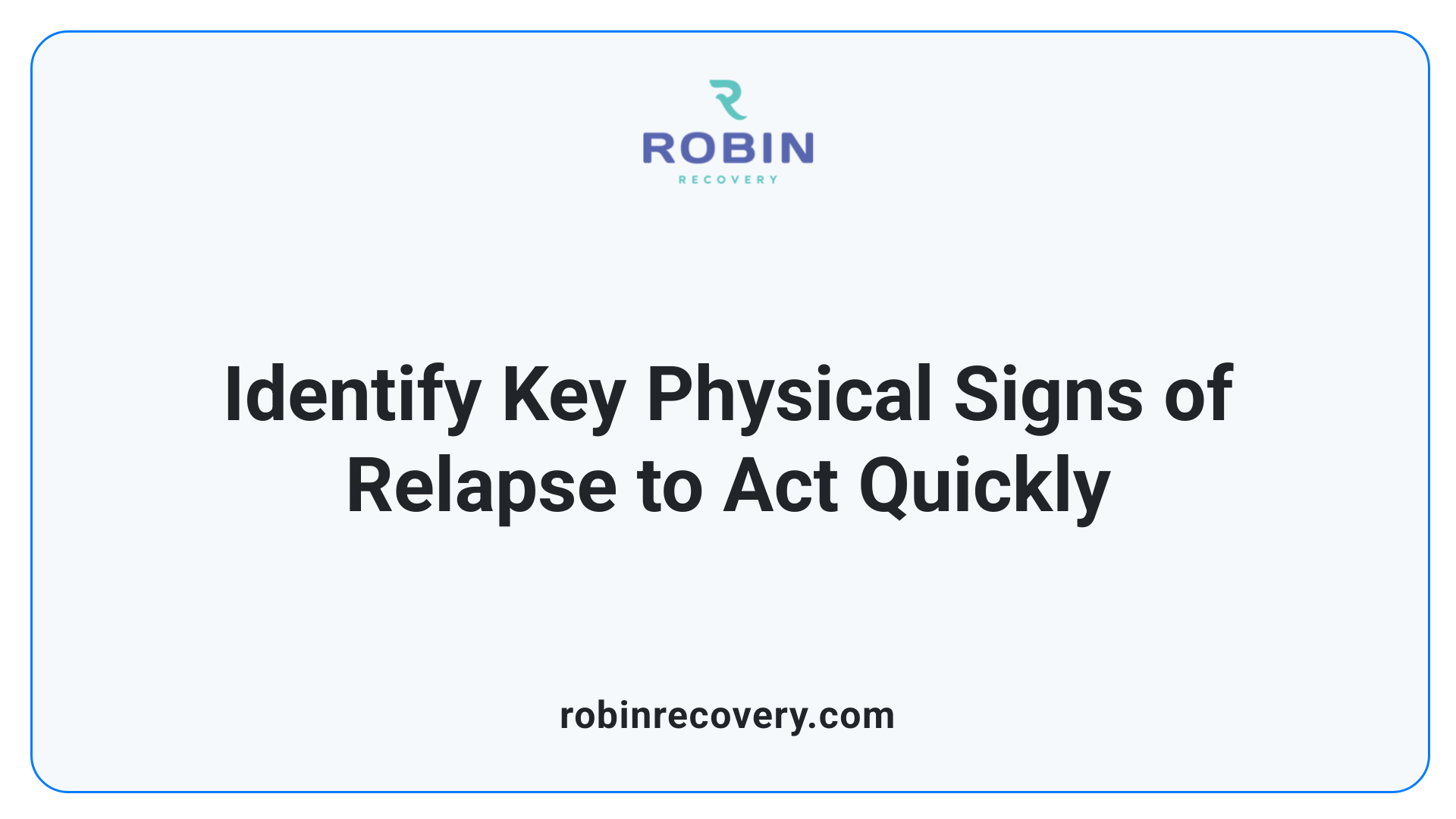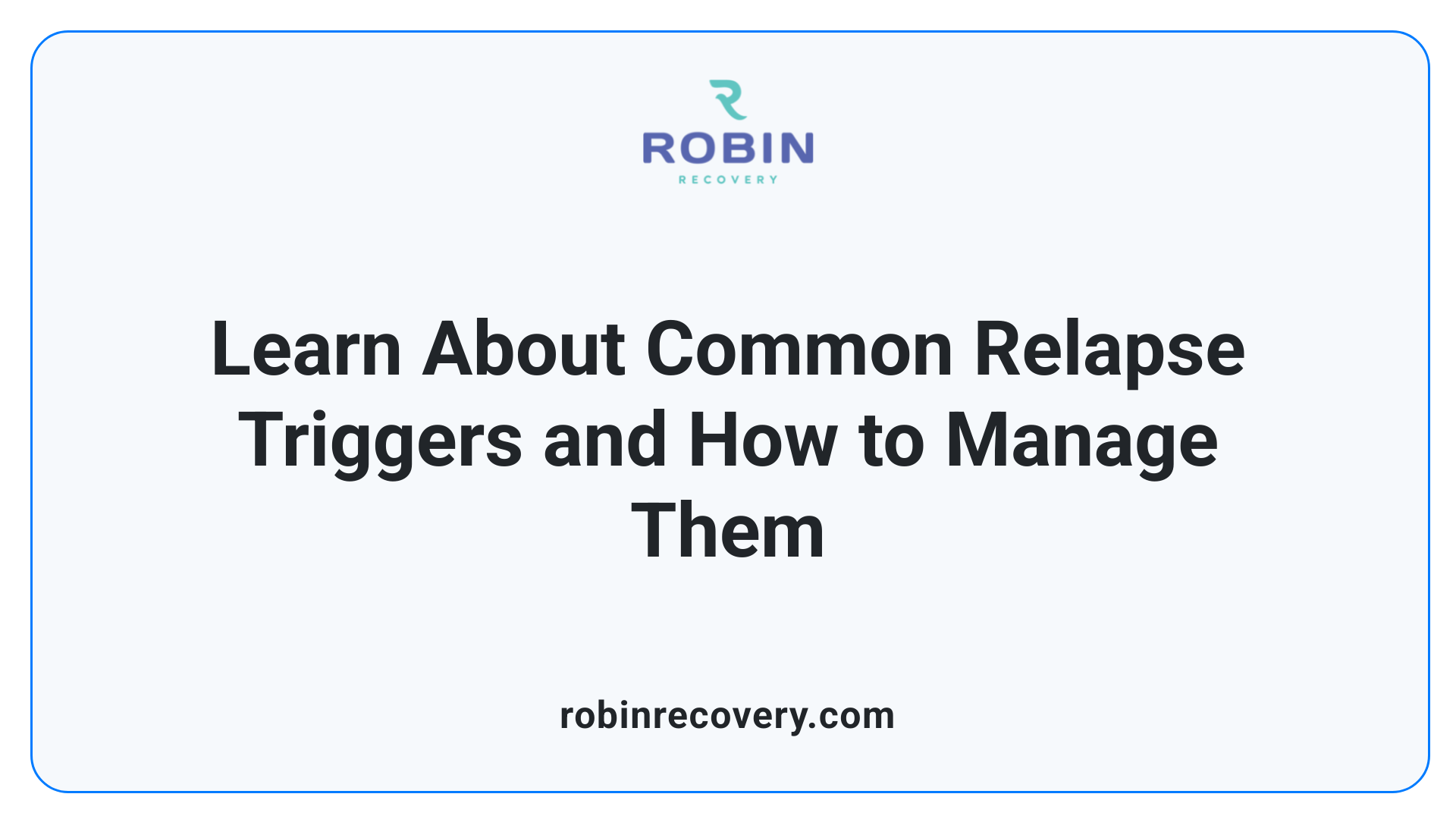How to Recognize the Signs of a Relapse in Loved Ones

Understanding Relapse in Recovery
Relapse is a common part of the recovery journey for individuals with substance use disorder (SUD), occurring in approximately 40-60% of cases. Recognizing the early signs can make a significant difference in prevention and timely intervention. This article explores how to identify behavioral, emotional, and physical indicators of relapse, stages of relapse, and practical steps caregivers can take to support their loved ones effectively.
The Stages of Relapse: A Closer Look

What are the stages or indicators of relapse?
Relapse in substance use disorder typically unfolds through a series of phases rather than as a sudden event. Understanding these stages—emotional, mental, and physical—can help individuals and their support networks intervene early, reducing the likelihood of a full-blown relapse.
The first stage, emotional relapse, is characterized by negative feelings and behaviors that set the stage for relapse. Common signs include social withdrawal, mood swings, increased anxiety or irritability, poor self-care, and emotional vulnerability. During this phase, the individual might not consciously think about using substances but is emotionally unprepared to maintain sobriety.
The second stage, mental relapse, involves internal conflict. Here, the person may begin to think about substance use, romanticize past use, or rationalize that they can handle occasional use. They might also start to associate with old using friends or revisit places linked to their substance use. Cravings and justification of reasons to relapse can intensify, increasing the risk.
Finally, physical relapse occurs when the person resumes substance use. This stage often follows emotional and mental signs, serving as the most visible indicator of relapse. It can happen abruptly or gradually, especially if warning signs in the earlier stages are overlooked.
Being aware of these stages and their warning signs is crucial for prevention. Strategies such as seeking support, employing coping skills, avoiding triggers, and maintaining engagement in recovery activities can help individuals stay on track. If early signs appear, reaching out to a counselor or support group can make a significant difference and possibly prevent full relapse.
Identifying Behavioral Red Flags in Loved Ones
What are the signs that someone is relapsing emotionally?
Recognizing early emotional signs of relapse is vital for intervention. Emotional relapse often manifests as increased irritability, mood swings, anxiety, and feelings of discontent. The person may become withdrawn socially, stop attending support groups, or neglect their self-care routines, including proper eating and sleeping habits.
Bottling up feelings, denial of relapse, and experiencing restlessness or exhaustion are common behavioral indicators. They might also display a diminished motivation to participate in recovery activities, showing signs of frustration or emotional exhaustion.
In terms of observable behavior, warning signs include feeling irritated or restless, avoiding social contact, or losing interest in hobbies and routines that previously supported their recovery. Such emotional shifts can happen weeks or months before another physical substance use occurs.
Early detection of these emotional symptoms allows caregivers and loved ones to provide support or encourage seeking help, potentially preventing the progression to mental or physical relapse.
Signs of relapse in behavior
Beyond emotional changes, certain overt behaviors may also suggest someone is relapsing, including increased isolation from friends and family, neglecting responsibilities, and engaging in risky activities.
People may start reconnecting with old acquaintances involved in substance use, which significantly raises the risk of relapse.
They might also exhibit poor self-care, such as neglecting personal hygiene, sudden weight changes, or signs of exhaustion. These behaviors, combined with risky decision-making like reckless social activities, are strong indicators that their recovery could be compromised.
Promptly noticing these signs can facilitate timely intervention, ensuring the person receives necessary support to stay on their recovery path.
Behavioral Red Flags Description Additional Notes Increased Isolation Avoiding social interactions Often linked to emotional withdrawal Poor Self-Care Neglecting hygiene and health May include unkempt appearance or weight changes Risk-Taking Behaviors Engaging in dangerous activities Social drinking, drug use, or reckless decisions Skipping Support Meetings Missing therapy or support groups Indicates waning commitment to recovery Reconnecting with Old Acquaintances Contacting former drug-using friends Sign of temptation reemerging
How caregivers can help
Recognizing these signs allows caregivers to approach their loved ones with compassion and support. An honest, non-judgmental conversation at a suitable moment can open the door to addressing concerns.
Setting boundaries, encouraging professional help, and involving support systems like therapy or groups can make a positive difference.
Family and friends should also stay attentive to their own mental health and seek support if needed, as caring for someone in recovery can be emotionally taxing.
Physical Signs of Substance Use Relapse

What physical signs indicate a relapse?
Recognizing physical indicators of substance use relapse is crucial for timely intervention and support. These signs can be subtle or more apparent, but when observed collectively, they often point to a relapse in progress.
Common physical signs include significant changes in grooming and hygiene. For instance, a person may neglect personal cleanliness, appear disheveled, or exhibit a sudden decline in overall appearance.
Unexplained weight loss or gain can also signal relapse, especially if accompanied by changes in diet or activity levels. Eyes may appear bloodshot or have pupils that look unusually small or dilated, which can be visible signs.
Speech might become slurred or monotonous, and coordination can be impaired, leading to awkward movements or difficulty with balance. Tremors are another common sign, often noticeable in hands or fingers.
Additionally, some individuals develop dermatological issues such as scabs, increased acne, or track marks—scratches or scars that may appear on the skin due to injection drug use.
These physical clues are often evident and can serve as tangible evidence alongside behavioral or emotional changes. Early detection of these signs can lead to faster support and renewed recovery efforts.
Physical Signs Description Additional Details Changes in hygiene Neglecting personal cleanliness, disheveled appearance Often accompanies emotional or behavioral signs Unexplained weight change Sudden weight loss or gain May reflect underlying health or substance use issues Bloodshot eyes Redness in eyes Indicates possible intoxication or drug use Slurred speech Slow, unclear speech Suggests intoxication or neurological impact Lack of coordination Clumsiness or difficulty walking Common after recent substance use Tremors Involuntary shaking of hands or limbs Occurs due to intoxication or withdrawal Skin problems Scabs, increased acne, track marks Signs of skin irritation or injection drug use
Being aware of these physical signs enables families, friends, and caregivers to intervene early, potentially preventing further relapse and guiding individuals toward support and treatment.
Understanding Triggers and Warning Signs

What is the most common trigger for relapse?
The most frequent trigger for relapse is stress. Life events such as relationship problems, financial struggles, or health concerns can create intense emotional pressure. These stressors often lead to feelings of anxiety, depression, or anger, which can ignite cravings for substances.
Emotional states like loneliness, shame, and frustration also play a significant role. When individuals experience these feelings, they might seek relief through substance use as an escape.
External cues are powerful triggers too. Places, people, sights, smells, or situations that are linked to past substance use can act as reminders and tempt individuals to relapse. For example, walking past a bar or reuniting with old using friends can reignite cravings.
Boredom can be deceptively dangerous. When individuals feel unoccupied or unfulfilled, they might revert to substances out of habit or as a way to pass time.
Overconfidence in one's recovery status can also lead to relapse. Believing that one is immune to cravings or that the danger has passed may cause individuals to relax their guard and inadvertently expose themselves to risk.
Recognizing these diverse triggers is crucial. Ongoing support groups, self-care routines, and coping strategies such as mindfulness or stress management techniques can help individuals identify and manage these triggers effectively, reducing the likelihood of relapse.
How can understanding triggers help prevent relapse?
By knowing what specific triggers induce cravings, individuals can develop personalized plans to cope or avoid these situations. This awareness allows for early intervention, such as reaching out to a support person when feeling overwhelmed or avoiding high-risk environments.
Creating a relapse prevention plan that incorporates identification of emotional and external cues enhances resilience. Regular therapy, participation in support groups, and developing healthy routines foster an environment where triggers are less likely to lead to substance use.
Responding Effectively to Relapse Indicators

Recognizing the signs that a loved one or someone close to you may be experiencing a relapse is essential for providing proper support. Early intervention can make a substantial difference in helping them regain their footing and prevent further substance use.
A crucial step in responding effectively is to offer emotional support. Approach the person with compassion and understanding, emphasizing that relapse is a common part of the recovery process and not a moral failing. Use supportive language such as, “I’m here for you,” or “We can get through this together.” Showing that you care and that they are not alone reassures the individual and can motivate them to seek help.
Setting boundaries is equally important. Establish clear, healthy limits to protect your wellbeing and prevent enabling behaviors. For example, you might decide not to support substance use directly or to avoid situations where they are under the influence. Boundaries also include encouraging the person to engage in treatment and recovery activities without coercion.
Seeking professional help is often vital after a relapse. Encourage your loved one to consult with healthcare providers or addiction specialists. Supporting their participation in therapy, support groups, or medication-assisted treatment can offer a structured path to recovery. Remember, relapse signifies a need to revisit or modify the treatment plan, and professional guidance can facilitate this process.
Early intervention can prevent a full relapse and promote long-term recovery. Pay attention to warning signs such as secretive behaviors, mood swings, withdrawal, and changes in personal habits or appearance. When you notice these signs, approach the person at a neutral time and space, communicating your concerns calmly and without blame. Suggest specific steps they can take, including speaking with a counselor or joining support groups.
In sum, responding effectively involves a combination of empathy, boundary-setting, encouragement to seek professional assistance, and timely intervention. Recognize relapse as a part of the broader recovery journey—an opportunity to reassess and strengthen support systems rather than an endpoint. Remember, continuous support and compassion are fundamental to helping someone navigate the challenges of recovery and relapse.
Building a Supportive Environment post-Relapse

Support groups
Support groups are a vital part of recovery after a relapse. They provide a safe space where individuals can share their experiences, discuss challenges, and receive encouragement. Groups like Alcoholics Anonymous (AA) or Narcotics Anonymous (NA) foster a sense of community and accountability, helping members stay focused on their recovery goals. Regular attendance can reinforce healthy habits and remind individuals they are not alone in their journey.
Therapy and counseling
Professional therapy and counseling are essential tools, especially after a relapse. These services help uncover underlying issues that may contribute to substance use, such as stress, trauma, or mental health disorders. Tailored treatment plans involving cognitive-behavioral therapy (CBT) or medication-assisted treatment (MAT) can assist in managing triggers and developing coping strategies. Ongoing therapeutic support encourages resilience and builds skills necessary to maintain sobriety.
Creating a relapse prevention plan
A relapse prevention plan is a personalized strategy that anticipates potential triggers and outlines steps to avoid or handle temptations. It includes identifying high-risk situations, developing healthy routines, and knowing whom to contact for support. The plan also emphasizes self-care, stress management, and regular check-ins with healthcare providers. Having this outline in place makes it easier to respond effectively should cravings or emotional upheavals occur.
Family involvement
Family support significantly influences recovery success. Educating loved ones about the signs of relapse and how to respond can prevent setbacks. A supportive family provides emotional stability and encouragement, helping the individual feel valued and understood. Family involvement may include participating in therapy sessions, establishing boundaries, and fostering open and honest communication. Healthy family dynamics create a nurturing environment that promotes sustained recovery.
The Role of Professional Assistance and Resources
What is SAMHSA’s National Helpline?
SAMHSA’s National Helpline is a free, confidential, 24/7 service that offers support and treatment referrals to individuals and families dealing with mental health or substance use issues. This helpline is a vital resource, providing referrals to local treatment centers, support groups, and community organizations. Available in both English and Spanish, it ensures broader accessibility for those in need.
In 2020 alone, the helpline received over 833,000 calls, demonstrating its significant role in supporting recovery efforts. It does not provide direct counseling but connects callers with qualified resources. The service maintains strict confidentiality, asking only for geographic details to facilitate proper referral routing.
Additionally, there is a text messaging option called HELP4U. Users can text their ZIP codes to find local support options, although this feature is limited to English. The 24/7 availability of the helpline makes it an essential tool for those seeking urgent help or guidance at any time of day.
Treatment options after relapse
Experiencing a relapse does not mean failure; instead, it can serve as a learning opportunity to reassess and strengthen one's recovery plan. Post-relapse treatment options include returning to inpatient rehab programs, participating in therapy and counseling, or joining support groups such as AA or NA. Medication-assisted treatment (MAT) is often recommended for certain substance use disorders.
MAT involves the use of medications like Suboxone or Vivitrol to reduce cravings and withdrawal symptoms, supporting long-term recovery. These medications are combined with counseling and behavioral therapies, creating a comprehensive approach tailored to individual needs.
Medication-assisted treatment
Medication-assisted treatment plays a practical role in managing substance use disorder. Suboxone, Vivitrol, and similar medications help stabilize brain chemistry, lessen illicit drug use, and improve patients' chances of sustained recovery.
It is important to note that MAT should be administered under medical supervision and be part of a broader treatment plan. Combining medication with counseling enhances overall effectiveness and helps address the psychological aspects of addiction.
By utilizing available resources like the SAMHSA helpline, engaging in appropriate treatment plans, and considering medication-assisted options, individuals can effectively manage relapse risks and support their journey toward long-term recovery.
Moving Forward with Compassion and Awareness
Recovering from relapse is a process that requires patience, understanding, and ongoing effort. By recognizing the early warning signs—whether behavioral, emotional, or physical—and responding with compassion and support, caregivers can significantly influence their loved ones' journey to sustained sobriety. Remember, relapse is not a failure but a stepping stone in recovery, and professional resources like SAMHSA’s National Helpline are valuable tools for guidance and assistance. With awareness and proactive intervention, it’s possible to navigate relapses effectively and foster lasting recovery.
References
- National Helpline for Mental Health, Drug, Alcohol Issues
- Warning Signs of Relapse: Depression, Stress, and Other ...
- Signs My Loved One Has Relapsed
- What Family and Loved Ones Should Know About Relapse
- How Can You Tell If Someone Has Relapsed On Drugs?
- When Your Loved One Has a Relapse in Addiction
- Recognizing Early Signs of Relapse
- 7 Signs My Loved One Has Relapsed - Diamond House Detox
